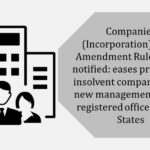With the Parliament not in session, and the President being satisfied that circumstances exist for taking immediate action with regard to certain provisions of the Companies Act, 2013 (“Act”), the Ministry of Law and Justice has, in a notification dated November 2, 2018, issued the Companies (Amendment) Ordinance, 2018 (“Ordinance”).
The Ordinance is effective immediately.
Key Highlights:
- The applications for change in Financial Year will now have to be made to the Central Government and not the Tribunal.
- A new provision- Commencement of Business, etc. has been incorporated which requires the company to file with the Registrar that every subscriber to the memorandum has paid the value of the shares as agreed. The declaration must be filed within 180 days of incorporation in prescribed form. Non-filing will attract penalty, Rs. 50000 for a Company and Rs.1000 for Officer in Default for each day up to a maximum limit of Rs.1 lakh and may result in removal of the company name from the Register of Companies. The provision also requires a verification of registered office of such company.
- Registrar may undertake physical verification of the Registered Office of a company on having cause to believe that it is not carrying out its business operations. On finding default, Registrar will proceed with removal of name of the company from Register of Companies.
- Conversion of public company to a private company to take place with the approval of the Central Government. However, applications made before the commencement of this ordinance will be dealt with under the previous provisions.
- Charges created before commencement of Ordinance must be registered within 300 days of their creation and in case the charge is not registered within this time, they must be registered within 6 months from the date of commencement of Ordinance on payment of additional fees.
- Charges created after commencement of Ordinance must be registered within 60 days of their creation, and in case the charge is not registered within this time, the Registrar may on application, allow the registration of the charge within a period of further 60 days on payment of ad valorem fees.
- Furnishing of false or incorrect information or knowingly suppressing any material information with respect to registration of charges will attract penalty for fraud under the Act.
- Failure of declaration by beneficial owner will now attract additional penalty of 1 year imprisonment.
- In case of failure to file annual return Company and officer-in-default will be liable to a penalty of Rs.50000 and in case of continuing default, further penalty of Rs.100 for each day up to maximum Rs.5 lakhs will be imposed. No imprisonment will be imposed in such cases.
- Penalty for failure to file resolution, failure to file report on AGM, contravention of maximum number of directorships, issuing of shares at discount, default in filing of notice with regard to alteration of share capital have been revised and fines for several other contraventions have been replaced with penalty, making them civil offences.
- In case of contravention of the maximum number of limits for directorship as prescribed i.e. 20 for private companies and 10 for public companies, the same will be the ground for disqualification of Director.
- Earlier Independent Directors were not entitled to stock options and could receive sitting fees, reimbursement of expenses for participation in Board and profit related commission. Now this has been omitted.
- For failure to comply with the provisions of Overall Maximum Managerial Remuneration and Managerial Remuneration in Case of Absence or Inadequacy of Profits, fine for individual is fixed at 1 lakh and for company at 5 lakhs
- Two new grounds for removal of name of company from register of company have been added-
- If the subscribers of Memorandum of Association of the Company have not paid the subscription amount and have not furnished a declaration in this regard within 180 days
- If the company is revealed to not have any registered office after physical verification of registered office.
- In cases of fraud, where the fraud involves an amount less than Rs.10 lakh or 1% of the turnover of the company and does not involve public interest the defaulter will now be punishable with imprisonment for a term which may extend to 5 years. The maximum fine in this regard has be increased from Rs. 20 lakhs to Rs. 50 lakhs.
- Offences which are punishable with imprisonment only or with imprisonment and fine will not be compoundable
- For repeated default within 3 years, under the Companies Act, 2013, double penalty will be imposed upon such defaulter
- The pecuniary jurisdiction of Regional Director has been widened by enhancing the limit up to Rs. 25 lakhs as against earlier limit of Rs. 5 lakhs
Further to this Ordinance, the Ministry of Corporate Affairs (“MCA”) has issued another Notification proposing to bring in further amendments (“Draft Amendments”) to the Companies Act, 2013.
The MCA believes that this Ordinance does not completely satisfy the need of the hour and has proposed further amendments of urgent nature to strengthen the corporate governance & enforcement framework.
Comments and suggestions on the Draft Amendments are invited till November 20, 2018 and may be sent through e-mail at comments_rbcao@mca.gov.in.
The format for sending in comments has been specified as follows:
- Name, contact number, e-mail address and postal address of stakeholder
- Suggestions/comments as under:
| Serial Number | Clause / Sub Clause | Suggestion / comments | Justification |
Key Highlights:
- The proposed amendment will require the Prospectus to be filed and not registered.
- As per the Draft Amendment the company will also have to take all necessary steps to find out if there is any individual who is a significant beneficial owner in relation to the company and if so, to identify him and require him to comply with the provisions of this section. On failure to take such necessary steps, fine not less than Rs.10 lakh but which may extend to Rs. 50 lakh and where the failure is a continuing one, with a further fine which may extend to Rs.1000 for every day will be imposed.
- For new companies, where the company has not completed the period of three financial years since its incorporation, it will have to comply with its Corporate Social Responsibility Policy for such period that has elapsed since its incorporation.
- Further, any amount remaining unspent under the CSR Policy must be transferred by the company within thirty days from the end of the financial year to a special account, the Unspent Corporate Social Responsibility Account, opened by the company for that financial year in any scheduled bank. Such amount must be spent by the company in pursuance of its Corporate Social Responsibility Policy within a period of three financial years from the date of such transfer.
- For any person, who has or had no pecuniary relationship, other than remuneration as such director or having transaction not exceeding ten per cent. of his total income, with the company, its holding, subsidiary or associate company, or their promoters, or directors, during the two immediately preceding financial years or during the current financial year, to be identified as independent director the following must be ensured-
- the total pecuniary relationship must not exceed twenty-five per cent. of his total income, of which, professional or any services rendered by him, other than such services, as may be prescribed, shall not account for more than ten per cent. of his total income:
- the remuneration received and expenses incurred for participation in the Board and other meetings must not be accounted for determining the total pecuniary relationship, unless otherwise provided.
- Independent director in addition to giving declaration of independence at Board Meeting and change in circumstances will have to file a return with the Registrar, containing particulars of his independence.
- An independent director, on resignation, must forward a copy of his resignation along with detailed reasons for the resignation to the Registrar within seven days of giving notice. The resignation of an independent director will take effect on the 30th day from the date of receipt of notice by the company under sub-section or such later date as may have been specified in the notice
- Where a decision of the Tribunal results in the termination, setting aside or modification, of any agreement, between the company and the managing director, any other director or manager, such person must not hold the office of a director or any other office connected with the conduct and management of the affairs of any company for a period of five years, and will not be paid, any compensation for the loss or termination of office.
- Upon the dissolution of a company, all property and rights vested in or held on trust for the company (excluding property held by for another person), will vest in the Central Government immediately before the dissolution.
- As per the Draft Amendments, a company will no longer be wound up by passing a special resolution. Further, inability to pay debts will not be a circumstance for winding up of unregistered companies.




